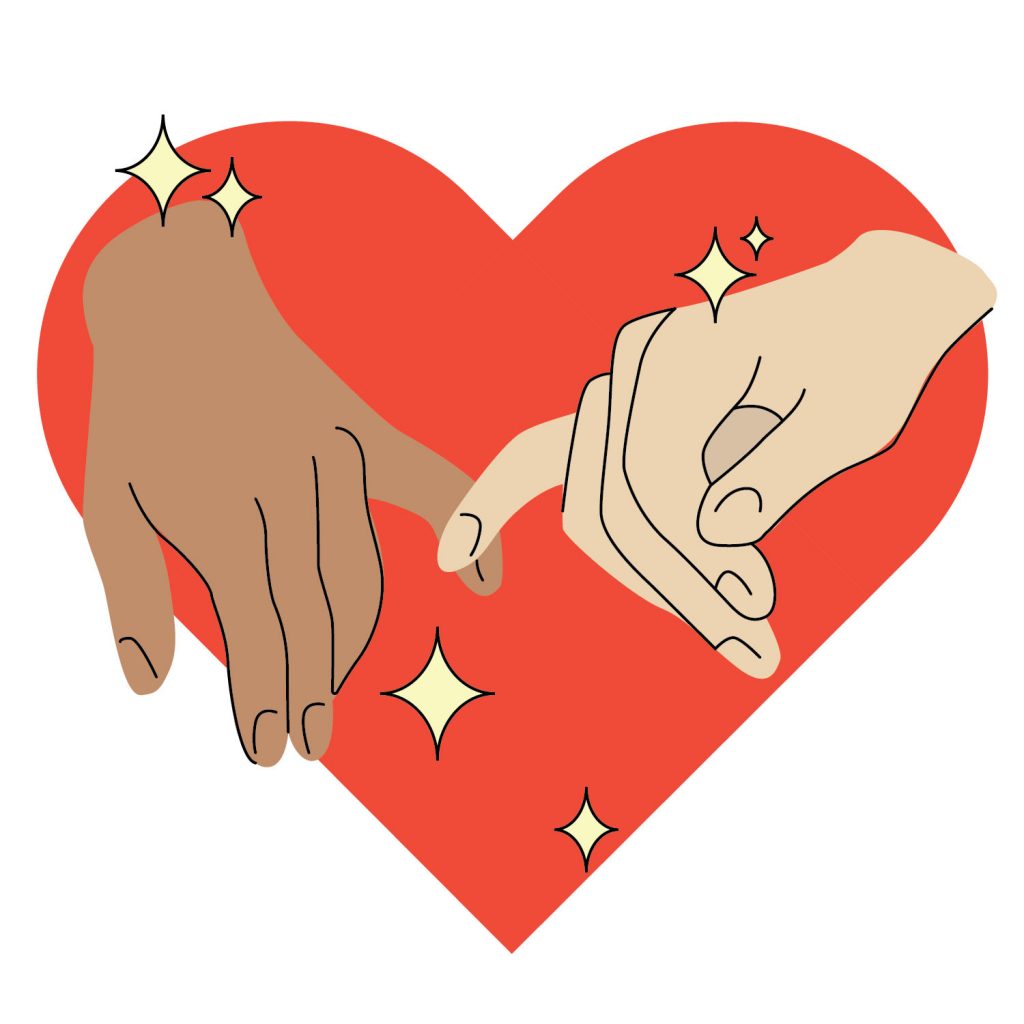Do you know your love language? Do you like to know that a person is thinking about and appreciating you? The concept of love languages is that everyone has a way in which they want to be loved; a way of connecting that they respond to better than others.
“The Five Love Languages” is a book by Gary Chapman that explains the love languages and how they impact a person’s life. Knowing your love language can be helpful in romantic relationships, friendships or between parents and children.
In respect of Chapman’s book, there are only five different ways we can love each other. Keep reading to see what each language appreciates, which ones are compatible, and ways you can better show love to your loved ones. Also, if you or someone you know is not sure of their primary love language, take the official quiz. It’s very brief and even has a link to gift ideas. 
If your primary love language is quality time, that means you appreciate when people make time to give you their attention. For you, one-on-one interaction speaks volumes to the love and care a person holds for you, whether you have actual plans or are just enjoying each other’s company.
Compatibility:
- With words of affirmation:
When spending quality time with your partner or loved ones, which might satisfy them, they are bound to express their love for you verbally, which might satisfy you.
The same idea applies here. If you and your partner or loved ones are spending time together, they will more than likely express their love physically.
How to speak this language:
In an effort to show your friends you care for them, you could set aside time to hang out with them. You could study with them, get dinner with them or go on a fun adventure with them and show them something new.
For your partner, you could plan a special date, make time for a movie or game night, make plans to meet their friends and family or just hang out.
For yourself, self-care is key. We often don’t take the time to isolate ourselves and do things we want or need to do for our physical, mental and emotional maintenance. So, maybe take a day or two out of the week to be alone and put on a hydrating face mask, watch your favorite show, have a drink and silence your phone. Most importantly, don’t feel bad about it.

If your primary love language is words of affirmation, you prefer when someone verbally validates their love for you. It could be in the form of compliments, general appreciation or praise. Whatever form it takes, it’s most important that you hear and are reassured of someone’s gratitude towards you.
Compatibility
Though you may complete an act of service for someone because you care about them and their well being, it is ideal that they would still thank you. Their gratitude, or maybe even praise, could be an expression of their love that satisfies a need for verbal validation.
Physical touches can be, and many times are, accompanied by words of endearment, even little reminders like an “I love you” or “I missed you.” This satisfies both peoples’ love languages.
How to speak this language:
If your friends and/or partner needs to hear your love, you could text them, Facetime, or call them to let them know you care. Tell them you love them, miss them or are just thinking about them. Another way to verbally be there is by saying supportive words to your friends. You could even make a fun video and send it to them.
For yourself, it’s important to take the time to say endearing and nice things. Go to a mirror, look yourself in the eye and say, “I love you, you’re amazing and doing great. Keep it up.” Especially if you’re having a tough time, you have to be there for yourself.

If your primary love language is acts of service, you really appreciate it when the people you love go out of their way to do things for you, especially if it’s something they don’t particularly like or if it eases stress for you. Maybe someone you love could run errands for you, help you with homework or just participate in an activity you don’t enjoy for you. All in all, it’s most important that they are doing something on your behalf, even if it may inconvenience them.
Compatibility
An act of service can mean many different things to different people. Since it is so subjective, a loved one expressing their care for you could be tangible, like a gift, or more literally, a service, like running errands for you or helping you out with a difficult task. Also, in return for them performing an act for you, you might get them a gift as your token of appreciation. Thus, your languages are being fulfilled simultaneously.
How to speak this language:
While there are many different ways to show your friends and partner you love them in this way, there are a few simple ones worth looking into. You could volunteer to run errands (like grocery shopping) for them or even offer to assist with work. You could even clean their room.
To do yourself a service, which would also greatly benefit your mental health, you might clean your room, organize your possessions, journal your thoughts or buy yourself some lavender incense to burn in your room. You should try to get things done, but remember to give yourself breaks and not be too harsh.

If your primary love language is physical touch, it’s pretty self explanatory. You enjoy any form of physical contact really, no matter how subtle, and especially the big things, such as hugs and when people put their arms around you. It’s even better when they do these things in public to show you they appreciate, love and care about you and aren’t embarrassed about who sees.
Compatibility
Spending quality time that involves in-person activities with your loved ones is a sure way to lead to hugs of appreciation!
How to speak this language:
In hopes of showing how much you care for your friends and partner physically, there’s nothing better than a nice hug, especially when they really need one. Other ways to express this language include kisses, holding their hand or wrapping your arm around them.
To express physical touch to yourself, give yourself a high-five when you’re proud of yourself, especially when finishing a task that was hard to get through or when you do something spectacular.

If your primary love language is receiving gifts, well, you like gifts. When someone you love gives you something you see it as a physical token of their love, appreciation and gratitude. It lets you know that they were thinking of you, and it means even more if you two haven’t seen each other in a while. For you, the best mode of reassurance is tangible.
Compatibility
- With words of affirmation:
Like with acts of service, what one considers a gift is subjective. If someone you love presents you with a tangible gift, your gratitude and appreciation for it could be reassuring and act as a mechanism to express your love for them.
One tangible way to express your appreciation and care for a loved one, especially after they give you a gift, is through physical touch. It could be a hug or even a kiss, just some form of physical interaction to show that you care.
Another intangible way to express your love is to spend quality time with your partner or friends to show your appreciation for a gift. It would be extra special if the gift could lead to spending time with your loved one, like a trip or a craft.
How to speak this language:
This one is easy. If you’re out and you see things that make you think of your friends or partner, get it for them to let them know you’re thinking about them. If you know about anything they’re super into, look for things associated with it, like socks from their favorite show or vinyls of albums they like.
For yourself, if there’s something you want, anything at all, get it for yourself. You should splurge on yourself every once in a while, specifically around big holidays and sales.
In every relationship, people are going to need reassurance, support and care. When you know how to show the people you love how much care and appreciation you have for them (and vice versa), it’s a lot more meaningful. Here’s to long, happy, fulfilling relationships. Happy Valentine’s Day!
Understanding your love language
Do you know your love language? Do you like to know that a person is thinking about and appreciating you? The concept of love languages is that everyone has a way in which they want to be loved; a way of connecting that they respond to better than others.
“The Five Love Languages” is a book by Gary Chapman that explains the love languages and how they impact a person’s life. Knowing your love language can be helpful in romantic relationships, friendships or between parents and children.
Advertisement
In respect of Chapman’s book, there are only five different ways we can love each other. Keep reading to see what each language appreciates, which ones are compatible, and ways you can better show love to your loved ones. Also, if you or someone you know is not sure of their primary love language, take the official quiz. It’s very brief and even has a link to gift ideas.
If your primary love language is quality time, that means you appreciate when people make time to give you their attention. For you, one-on-one interaction speaks volumes to the love and care a person holds for you, whether you have actual plans or are just enjoying each other’s company.
Compatibility:
When spending quality time with your partner or loved ones, which might satisfy them, they are bound to express their love for you verbally, which might satisfy you.
The same idea applies here. If you and your partner or loved ones are spending time together, they will more than likely express their love physically.
How to speak this language:
In an effort to show your friends you care for them, you could set aside time to hang out with them. You could study with them, get dinner with them or go on a fun adventure with them and show them something new.
For your partner, you could plan a special date, make time for a movie or game night, make plans to meet their friends and family or just hang out.
For yourself, self-care is key. We often don’t take the time to isolate ourselves and do things we want or need to do for our physical, mental and emotional maintenance. So, maybe take a day or two out of the week to be alone and put on a hydrating face mask, watch your favorite show, have a drink and silence your phone. Most importantly, don’t feel bad about it.
If your primary love language is words of affirmation, you prefer when someone verbally validates their love for you. It could be in the form of compliments, general appreciation or praise. Whatever form it takes, it’s most important that you hear and are reassured of someone’s gratitude towards you.
Compatibility
Though you may complete an act of service for someone because you care about them and their well being, it is ideal that they would still thank you. Their gratitude, or maybe even praise, could be an expression of their love that satisfies a need for verbal validation.
Physical touches can be, and many times are, accompanied by words of endearment, even little reminders like an “I love you” or “I missed you.” This satisfies both peoples’ love languages.
How to speak this language:
If your friends and/or partner needs to hear your love, you could text them, Facetime, or call them to let them know you care. Tell them you love them, miss them or are just thinking about them. Another way to verbally be there is by saying supportive words to your friends. You could even make a fun video and send it to them.
For yourself, it’s important to take the time to say endearing and nice things. Go to a mirror, look yourself in the eye and say, “I love you, you’re amazing and doing great. Keep it up.” Especially if you’re having a tough time, you have to be there for yourself.
If your primary love language is acts of service, you really appreciate it when the people you love go out of their way to do things for you, especially if it’s something they don’t particularly like or if it eases stress for you. Maybe someone you love could run errands for you, help you with homework or just participate in an activity you don’t enjoy for you. All in all, it’s most important that they are doing something on your behalf, even if it may inconvenience them.
Compatibility
An act of service can mean many different things to different people. Since it is so subjective, a loved one expressing their care for you could be tangible, like a gift, or more literally, a service, like running errands for you or helping you out with a difficult task. Also, in return for them performing an act for you, you might get them a gift as your token of appreciation. Thus, your languages are being fulfilled simultaneously.
How to speak this language:
While there are many different ways to show your friends and partner you love them in this way, there are a few simple ones worth looking into. You could volunteer to run errands (like grocery shopping) for them or even offer to assist with work. You could even clean their room.
To do yourself a service, which would also greatly benefit your mental health, you might clean your room, organize your possessions, journal your thoughts or buy yourself some lavender incense to burn in your room. You should try to get things done, but remember to give yourself breaks and not be too harsh.
If your primary love language is physical touch, it’s pretty self explanatory. You enjoy any form of physical contact really, no matter how subtle, and especially the big things, such as hugs and when people put their arms around you. It’s even better when they do these things in public to show you they appreciate, love and care about you and aren’t embarrassed about who sees.
Compatibility
Spending quality time that involves in-person activities with your loved ones is a sure way to lead to hugs of appreciation!
How to speak this language:
In hopes of showing how much you care for your friends and partner physically, there’s nothing better than a nice hug, especially when they really need one. Other ways to express this language include kisses, holding their hand or wrapping your arm around them.
To express physical touch to yourself, give yourself a high-five when you’re proud of yourself, especially when finishing a task that was hard to get through or when you do something spectacular.
If your primary love language is receiving gifts, well, you like gifts. When someone you love gives you something you see it as a physical token of their love, appreciation and gratitude. It lets you know that they were thinking of you, and it means even more if you two haven’t seen each other in a while. For you, the best mode of reassurance is tangible.
Compatibility
Like with acts of service, what one considers a gift is subjective. If someone you love presents you with a tangible gift, your gratitude and appreciation for it could be reassuring and act as a mechanism to express your love for them.
One tangible way to express your appreciation and care for a loved one, especially after they give you a gift, is through physical touch. It could be a hug or even a kiss, just some form of physical interaction to show that you care.
Another intangible way to express your love is to spend quality time with your partner or friends to show your appreciation for a gift. It would be extra special if the gift could lead to spending time with your loved one, like a trip or a craft.
How to speak this language:
This one is easy. If you’re out and you see things that make you think of your friends or partner, get it for them to let them know you’re thinking about them. If you know about anything they’re super into, look for things associated with it, like socks from their favorite show or vinyls of albums they like.
For yourself, if there’s something you want, anything at all, get it for yourself. You should splurge on yourself every once in a while, specifically around big holidays and sales.
In every relationship, people are going to need reassurance, support and care. When you know how to show the people you love how much care and appreciation you have for them (and vice versa), it’s a lot more meaningful. Here’s to long, happy, fulfilling relationships. Happy Valentine’s Day!